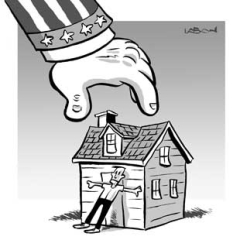The purpose of property rights is to mitigate conflict over scarce, rivalrous resources

The purpose of property rights is to mitigate conflict over scarce, rivalrous resources. To have a property right over a scarce, rivalrous resource is to have the right to exclude others from using that resource in the attainment of some ends. For example, I have property rights over my body, which means I can exclude others from using my body for sexual pleasure or labor without my consent. If they do access my body in such a way without my consent, it's called rape or slavery, respectively. Likewise, I have property rights over the accumulated capital for which I consensually trade my time and labor, which means I have the right to exclude people from using my accumulated capital without my consent. When someone accesses my accumulated capital in such a way without my consent, it's called theft or trespass.
Scale doesn't change this. If I transform my accumulated capital into a factory by hiring people who voluntarily exchange the product of their labor for some of my accumulated capital, this means that they value what they receive in exchange for working more than they value the direct product of their labor (the factory). Likewise, it means I value the factory more than the accumulated capital I gave up for it. This is a win-win situation, or a positive sum game. The workers I hired retain property rights over the capital they received as payment for their labor, which means they can exclude others from the use of their newly acquired accumulated capital, and I retain property rights over the factory, which means I can exclude others from the use of my factory.
Discrepancies between marginal benefit don't change this either. A consensual exchange doesn't become theft just because one party benefits more from the exchange than another. If this wasn't the case, every single instance of buyer's remorse would be indicative of theft. If someone agrees to produce a walking stick in exchange for ten dollars and the purchaser of the walking stick then sells it to someone else for twenty dollars, how can it be claimed that the producer of the walking stick was a victim of theft if they haven't been deprived of the ten dollars for which they voluntarily exchanged the walking stick? Would it have been reasonable to expect that the first purchaser of the walking stick wouldn't have obtained more than ten dollars of value from it given that the exchange wouldn't have happened in the first place if they hadn't valued the walking stick more than they valued ten dollars?
Of course not. Anything that happens to the walking stick after the original exchange is no business of the producer of the walking stick because said producer already exchanged his property rights to the walking stick for property rights to a different form of accumulated capital (ten dollars).
Likewise, if I use more of my accumulated capital to hire workers to work in my factory, they will only accept my offer of employment if they value what I'm offering more than their own free time and more than whatever stake they may have otherwise had in the product they will be producing. In other words, if they accept employment, it will be with the understanding that they're giving up any stake in what they're producing in exchange for what I'm offering them. Maybe my factory assembles televisions. Maybe one worker can produce one television per hour. Would they be able to produce televisions this efficiently without my previous investment in production capital (which hasn't even been recouped and probably never will be completely given that maintenance, employment and higher order production good costs are a revolving door)? Would they be able to produce televisions AT ALL without this previous investment in production capital? Of course not, and they know this, which is why they're willing to give up both their leisure and whatever stake their labor may have otherwise entitled them to in the production of a television in exchange for a fixed amount of accumulated capital.
As was the case with the walking stick, whatever happens to the television after this exchange occurs is no business of the worker. How could the future sale of the television constitute theft of the worker's accumulated capital if it can't be demonstrated that the worker was deprived of the accumulated capital that he voluntarily accepted as payment for the production of the television, especially given that the television was produced with other accumulated capital (plastic, circuits, labor saving devices, etc.) that the worker never even owned?
It can't.
Property ownership necessarily implies exclusivity, which means that "private property" is redundant, as is "personal property". The words "private" and "personal" denote exclusivity, which is already implied by the word "property". To differentiate between "personal property" and "private property" is therefore a distinction without a difference. This implication of exclusivity also means that "public property" is a contradiction in terms. If no one can be excluded from using the resource, it isn't property. Resources that aren't scarce or rivalrous likewise can not be considered property, which means that "intellectual property" is also a contradiction in terms.
This means that seizing the means of production is a genuine form of theft and that "pirating" music, software, art and writing is not, which may seem counter-intuitive if you attended the indoctrination camps euphemistically known as "public schools" when you were growing up.
Source: https://steemit.com/voluntaryism/@jaredhowe/private-and-personal-property-a-distinction-without-a-difference
Thanks for sharing